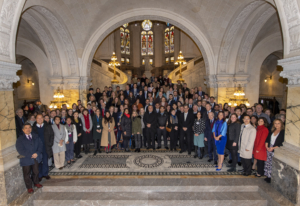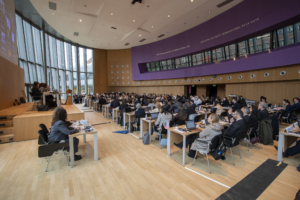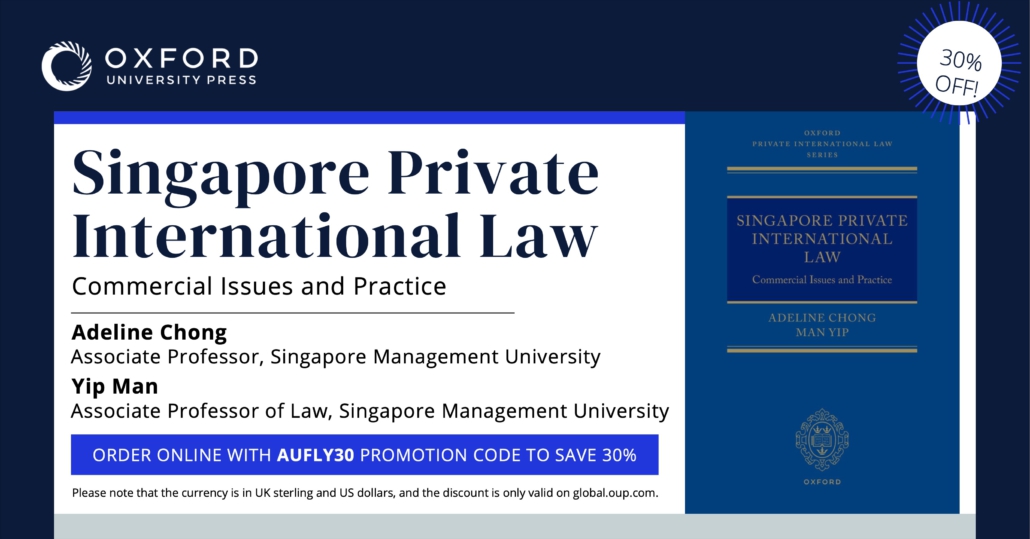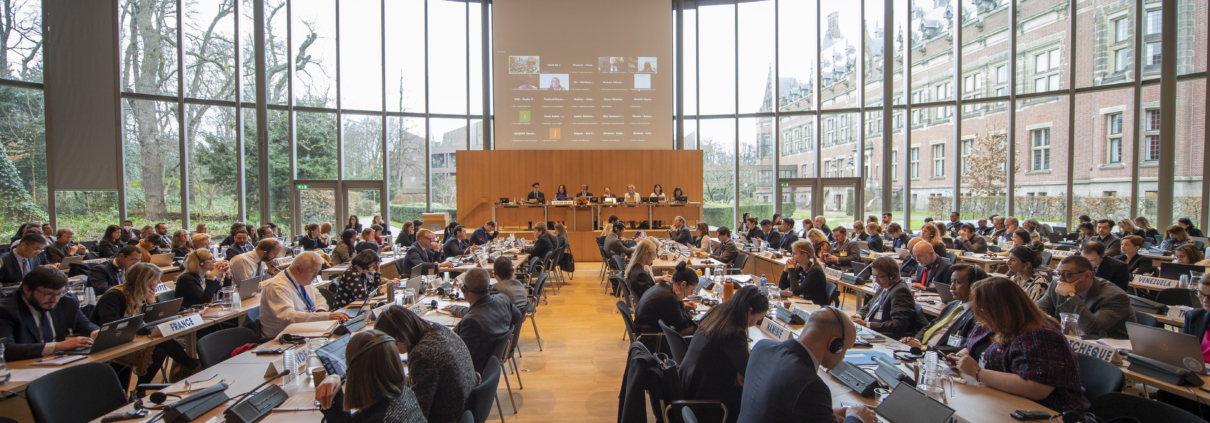Views
Nothing Found
Sorry, no posts matched your criteria
News
NGPIL Prize
Originally posted in News and events – Nigeria Group on Private International Law (ngpil.org)
On 4 March 2023, the Nigerian Group on Private International Law (“NGPIL”) colleagues were pleased to meet the winners of the 2023 NGPIL Conflict of Law’s Essay Prize. This year, we awarded two candidates, winner and first runner up, for excellent and engaging pieces on PIL and Nigeria.
Our winner, Oluwabusola Fagbemi, an LLM student from the University of Ibadan, Oyo State emerged as the winner of this year’s competition. She wrote on “A Comparative Analysis of Product Liability in the Conflict of Laws”, a piece that the deciding panel found to engage robust research, comprising of Nigeria common law, EU approach, English approach and US approach. Our winner was awarded 185,000NGN. In her words “It is an honour to be selected for The NGPIL Prize for the year 2022/2023. Thank you very much…It was also great to get to know them [NGPIL] and hear of their exciting work, and the impact that they are making in the PIL space globally… believe that The NGPIL is the right place for me to grow, learn, advance my career, and develop my interests in PIL. I will definitely keep in touch and remain connected, and I am looking forward to future collaboration.”
Adeyinka Adeoye from the Nigerian School of Law, Kano Campus received the 1st runner prize on her paper entitled “Product Liability in Private International Law” from a Nigerian perspective. She was awarded 65,000NGN. In her words “I am super excited that my essay emerged first runner-up. This news came at the best possible time“.
Huge congratulations to Busola and Adeyinka!
Conclusions & Decisions of the Council on General Affairs and Policy (CGAP) of the HCCH now available!
The Council on General Affairs and Policy (CGAP) of the HCCH met from 7 to 10 March 2023. The meeting was attended by over 450 participants, representing 80 HCCH Members, 8 non-Member States, 7 intergovernmental organizations, 9 international non-governmental organizations, and members of the Permanent Bureau. The Conclusions & Decisions adopted by CGAP are now available in English and French.
In terms of work relating to possible new legislative instruments, CGAP mandated the establishment of a Working Group on private international law (PIL) matters related to legal parentage generally, including legal parentage resulting from an international surrogacy arrangement. Noting progress made by the Working Group on matters related to jurisdiction in transnational civil or commercial litigation in the development of provisions for a draft Convention, CGAP invited the convening of two further Working Group meetings. It also supported further exploratory work on the PIL implications of the digital economy, including, among other, by mandating the conduct of a study on the PIL implications of CBDCs and by endorsing the launch of the HCCH-UNIDROIT Project on Law Applicable to Cross-Border Holdings and Transfers of Digital Assets and Tokens. Across several projects, CGAP welcomed the cooperation with UNCITRAL, UNIDROIT, and WIPO, including with respect to work in the areas of digital economy, insolvency proceedings and intellectual property.
In relation to post-Convention work, CGAP approved the Toolkit to Prevent and Address Illicit Practices on Intercountry Adoption and the Model Forms for use under the 1993 Adoption Convention, mandated the development of a Template for Country Fact Sheets on available post-adoption services relating to search for origins, and mandated the establishment of a Working Group on financial aspects of intercountry adoption. CGAP also agreed upon the extension of the scope of the International Hague Network of Judges (IHNJ) to matters relating to the 2000 Protection of Adults Convention. CGAP endorsed the Conclusions & Recommendations of the recent meetings of the Special Commissions (SCs) on the practical operation of the 1993 Adoption, 2000 Protection of Adults, and 2007 Child Support Conventions, and welcomed the preparations for the upcoming meetings of the SCs on the practical operation of the 1980 Child Abduction and 1996 Child Protection Conventions, to be held in the second half of 2023, and on the practical operation of the 1965 Service, 1970 Evidence and 1980 Access to Justice Conventions. Finally, CGAP mandated the PB to continue work, in partnership with relevant subject-matter experts, and subject to available resources, to study the 2006 Securities Convention and digital developments in respect of securities markets; the interpretation of analogous institutions for the purpose of Article 2 of the 1985 Trusts Convention; and, in relation to the 2015 Choice of Law Principles, the feasibility, desirability and necessity of developing guidance on applicable law in international contracts providing protection to weaker parties.
From a good governance perspective, CGAP approved the HCCH Strategic Plan for 2023-2028. It also decided to adopt Spanish as an official language of the HCCH as of 1 July 2024. Finally, CGAP decided to recommend Dr Christophe Bernasconi to the Netherlands Standing Government Committee on Private International Law for the position of Secretary General of the HCCH for another five-year mandate.


Out now: Chong and Yip, Singapore Private International Law: Commercial Issues and Practice

This book, by Adeline Chong and Man Yip, faculty members at the Yong Pung How School of Law at the Singapore Management University, is part of the Oxford Private International Law Series. There is a 30% discount for purchases made through the OUP website using the promotion code AUFLY30. The publisher’s blurb is as follows:
“There has been significant reform in Singapore private international law in recent years. Developments such as the establishment of the Singapore International Commercial Court, the incorporation of the Hague Convention on Choice of Court Agreements into Singapore law, and the enactment of the Insolvency, Restructuring and Dissolution Act 2018, have all thrown the country into a period of rapid growth.
Singapore Private International Law: Commercial Issues and Practice provides a roadmap to assist readers in navigating this changing landscape. In it, Chong and Yip offer an overview of Singapore’s legal system, exploring how governmental and judicial efforts have capitalised on Singapore’s location at the heart of Asia, its status as a leading financial centre globally, and its modern infrastructure, to make it the hub of choice for cross-border disputes and insolvency and restructuring efforts. Practical guidance is given to matters such as changes to jurisdiction, protective measures, the recognition and enforcement of foreign judgments, general choice of law issues, and issues specific to contract, tort, unjust enrichment, equitable obligations, trusts, property, corporations, and international insolvency and corporate restructuring. The book also looks at how the English common law principles have been implemented and developed in Singapore, with relevant cases, legislation, and foreign sources used to offer a comparative perspective.”
Further information can be found at this link: https://global.oup.com/academic/product/singapore-private-international-law-9780198837596?cc=sg&lang=en&#



